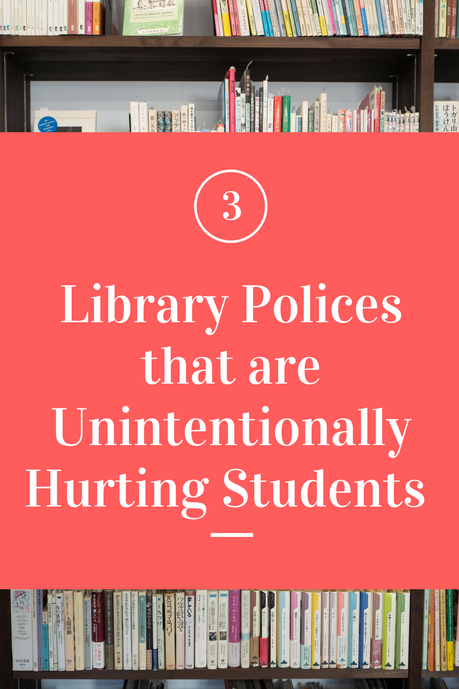|
Let me start off by saying that what I am going to talk about today may be controversial to some people, but it is my belief that we need to start thinking about why these policies are in place and how are they benefiting students. My hope is that this blog post will start to really spur a conversation within the librarian community and hopefully change some people's minds on some of these policies. The new school year is about to begin and with that comes the opportunity for each librarian to ask, are the rules and policies currently in my library breaking down barriers and making it easier for my students to access information and materials?
If you have any of the following three policies in place it is time to rethink them: 1. Students can not check out a book without an ID card - If students are required to wear ID cards at all times or if the ID card is used for multiple purposes in the school like for your lunch account etc than I have no problem with an ID Card being used for book checkout. If the ID card is only really only used for book checkout than I believe it is time to rethink this policy. Yes, I know the policy in most schools, especially High Schools is that students are supposed to have IDs on them at all times, but when the policy is not enforced and the ID card's only real purpose is for book check out, how can we really expect our students to have their IDs on them? In circumstances like this making students need an ID card to check out books is impractical and puts up unnecessary barriers for allowing students access to much needed books and materials. 2. Students can not check out books if they have a fine - Why are we denying students a chance to read due to the fact that they have not paid a fine for an overdue book? By enforcing a rule like this you are unintentionally making it so that students who might be economically disadvantaged are the ones who suffer the most. Lack of money and resources should never be a factor in access to information and no child should be turned away for checking out a book because his or her family can not pay a fine! In my over 15 years as a librarian, I have seen way too many students be afraid to take out a book because they did not want to lose it or pay a fine. Things have gotten so much easier for me once I moved to a district where there are no fines. I highly recommend looking into the idea of eliminating overdue fines for your library. Here is a great article in Slate about how some public libraries are eliminating fines. If public libraries can do it surely school libraries can also do so. 3. Students can only read certain level books or "just right books" / labeling books with level stickers - Library books should never be shelved by reading or grade level, by doing this you are unintentionally singling out students and potentially embarrassing them. I also believe that we should never make kids take out books within their "levels". Let students read what they want! When students are forced to read within levels or limit what they can read, the joy of reading soon begins to disappear. I completely agree with AASL's position statement on labeling books especially where it states "Student browsing behaviors can be profoundly altered with the addition of external reading level labels. With reading level labels often closely tied to reward points, student browsing becomes mainly a search for books that must be read and tests completed for individual or classroom point goals and/or grades. School library collections are not merely extensions of classroom book collections or classroom teaching methods, but rather places where children can explore interests safely and without restrictions. A minor’s right to access resources freely and without restriction has long been and continues to be the position of the American Library Association and the American Association of School Librarians. Labeling and shelving a book with an assigned grade level on its spine allows other students to observe the reading level of peers, thus threatening the confidentiality of students’ reading levels. Only a student, the child’s parents or guardian, the teacher, and the school librarian as appropriate should have knowledge of a student’s reading capability." This is by no means a complete list of all the ways that libraries policies can have unintentional consequences. Please feel free to add to the list and I would love to know your comments.
20 Comments
|
AuthorElissa Malespina is the High School Librarian at Verona High School and a Presenter, Author and much more. The views are my own. Find my full resume above. Archives
December 2020
Categories
All
|
- Trouble In Censorville
- Educational Equity Advisors
- AI School Librarian
- About Me
-
Presentations
- Information Privilege and Equity
- Collaborating to Create Policies Against Challenges & Bans
- How Future Ready Librarians Can Help Solve Problems
- It's Not The Complicated -Future Ready Librarians
- Best Websites
- Fighting Cuts - An Advocacy BluePrint
- Being a Librarian in the Age of Alternative Facts
- Future Ready Librarian
- Techspo 18- Future Ready Librarian
- Out of the Box Collaborations
- Augmented Reality in Schools and Libraries
- Augmented Reality in the Classroom with Aurasma
- Breaking down the classroom walls with Google Hangout
- Branding Your School and Library
- Connected Librarian
- Edmodo in the Classroom
- ISTE Forum - Marketing Your Library
- Library Trac
- Makerspaces
- Marketing Your Library - Keynote
- Making Yourself Relevant in an Age of Computers
- Making a QR code out of your Noodletools Work Cited
- Resume
- Understanding Inclusion Poster
- Thoughts on Technology - Blog
- Publications
- Interviews
- Virtual Debate
- Virtual Poetry Summit



 RSS Feed
RSS Feed
